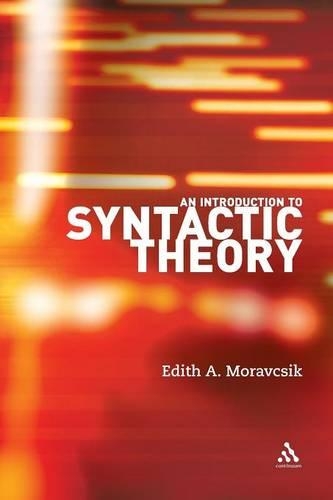
An Introduction to Syntactic Theory
(Paperback)
Available Formats
Publishing Details
An Introduction to Syntactic Theory
By (Author) Dr. Edith A. Moravcsik
Bloomsbury Publishing PLC
Continuum International Publishing Group Ltd.
7th June 2006
United Kingdom
Classifications
Tertiary Education
Non Fiction
415
Physical Properties
Paperback
272
Width 156mm, Height 234mm
450g
Description
This textbook provides a comprehensive, balanced introduction to syntactic theory. The author shows how the diversity of syntactic theories, which at first seems confusing, can be approached by examining how each deals with conflicting data. This approach helps the student to understand how syntactic theories are related to each other, what they necessarily have in common, and in what ways they actually differ. Theories introduced here include Transformational Generative Grammar, Relational Grammar, Word Grammar, Functional Grammar, and Optimality Theory, amongst others.
An Introduction to Syntactic Theory will be essential reading for undergraduate students of linguistics, whether they are new to the subject or studying it at a more advanced level.
Reviews
Why are there so many theories of syntax How is it that some scholars talk about syntax in ways that just don't register with us Edith Moravcsik starts from what is required of theory in any domain of inquiry, and considers how these requirements are met, to differing degrees, by various theories of syntax. She shows how mismatches arise, within syntax and in its relations to other modules, and how they are resolved. This book thus offers great insight into why other linguists think the way they do about syntax. It is even more useful for helping us as readers to understand why we do syntax the way we do." Greville G. Corbett, Distinguished Professor of Linguistics, University of Surrey
"...very much more than basic linguistic knowledge is necessary to understand the point of many of the discussions in this book. In our view, there is no point in discussing the strength or weakness of any modelised explanation in an introductory textbook without introducing all of the assumptions leading to these explanations. Unfortunately, this occurs numerous times in the book under review...Another point of criticism is the state of the art of some of the theories introduced. Especially the generative model is often introduced in its old fashioned shape, taking syntactic transformations as assumptions that are still made...Minor weaknesses we found are insufficient explanations in the glossary (What does otherwise dominant' mean w.r.t. the explanation of a processor (p.244)...There are also a few cases of poor representation of linguistic data...It is rather that it may not be quite reasonable to present this idea to beginners without sufficient preparation."-Peter hl, Studies in Language, September 2008 -- Peter hl
"...many of her [Moravcsik's] discussions are quite interesting to read, and many of the points she makes are important contributions to the thinking about linguistic theory. The most important contribution, however, in our view, is that there is no theory that can explain everything, and there is nothing that can be explained by one theory alone."- Peter hl, Studies in Language, September 2008 -- Peter hl
"It is a brave attempt to write a textbook in a theory-neutral framework and to illuminate abstract concepts of syntax by using examples from everyday life. However, a style which combines in one chapter an enigmatic quotation from Niels Bohr at the start but later draws an analogy between syntactic precedence and main course and dessert during a meal is not to my taste, and I tend to feel the intended audience of the book might agree. Although many syntactic facts are brought together in interesting and illuminating ways, they are somewhat diluted by a mass of information unrelated to syntax...I would not use this book as a primary text for introductory syntax at university level. On the other hand, the chapter summaries are tightly focused on syntax and I would expect students to find them helpful as concise reviews of basic concepts."- Manuela Schnenberger, Studies in Language, September 2008 -- Manuela Schnenberger
"How refreshing to find a textbook on syntax that strives not only for theoretical neutrality but also to educate its readers on the reasons for divergence of opinion in the literature ... The fact that Moravcsik cites a wide range of typologically distinct languages means this textbook is to be vastly preferred over those with a more Anglocentric focus. A welcome addition to any reading list." Dr Deborah L. Anderson, Affiliated Lecturer Dept. of Linguistics, University of Cambridge, UK
[The] book is incredibly well organized, obviously the product of a very tidy mind. Each chapter opens with a chart of the numbered content and its pagination, in slightly greater detail than the listing of chapter contents in the introductory material. Then, before the chapter begins, there is an ingenious and intriguing quote that is fundamentally relevant to what is to come ([the] book is worth browsing just to digest these quotes!). Each chapter also ends with a relevant and welcome conclusion, followed by the notes and some exercises for the students when used as a course book. -- John Hewson, Memorial University of Newfoundland, Canada * The Canadian Journal of Linguistics *
Author Bio
Dr Edith A. Moravcsik is Professor of Foreign Language and Linguistics at the University of Wisconsin-Milwaukee.
